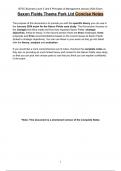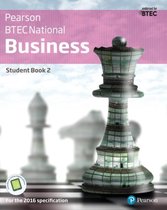BTEC Business Level 3 Unit 6 Principles of Management January 2024 Exam
Saxon Fields Theme Park Ltd Concise Notes
The purpose of this document is to provide you with the specific theory you can use in
the January 2024 exam for the Saxon Fields case study. The first section focuses on
the changes that Nina made and how they impacted Saxon Fields’ strategic
objectives, linked to theory. In the second section there are three challenges, three
proposals and three recommendations based on the current issues at Saxon Fields
(linked to strategic objectives). You can use these in your exam as they go into detail
with the theory, analysis and evaluation.
If you would like a more comprehensive set of notes, checkout the complete notes as
they aim on providing as much linked theory and content to the Saxon Fields case study
so that you can pick and choose parts to use that you think you can explain confidently
in the exam.
*Note: This document is a shortened version of the Complete Notes
1
,This section will compare how the company was run before and after Nina, so we can identify
what changes happened (to leadership, motivation, staffing etc) that have caused the challenges
that are negatively impacting the business goals.
Before and After Nina:
● Before: Leadership style - Paternalistic
○ When Chris Smith was running Saxon Fields, the leadership style shared aspects
of paternalistic, where the manager still makes all of the decisions but
incentivises the staff to make them feel empowered. Staff were empowered
through low cost accommodation, subsidies in the canteen and many social
activities
○ This style has the benefit of high staff empowerment and satisfaction but is
often slower in decision making
● After: Leadership style - Autocratic
○ It is clear that Nina is an Autocratic leader as she is the Managing Director, makes
changes without consultation, patrols staff with checklists, a sign of
micromanagement where staff are controlled and have no autonomy
○ On the leadership continuum she is furthest left at the ‘Tells’ stage
○ The benefit of the Autocratic style is quick decisions, however as Nina has no
relevant experience, these decisions are ineffective and have led to major
consequences (discussed in the next section)
○ There is an imbalance in John Adair's Action Centred Leadership Model which
suggests focus should be balanced between Achieving the Task, Managing the
Team and Managing Individuals. Nina is too heavily focused on ‘Managing
Individuals’ as she is described as a micromanager following staff around,
which can harm the ‘Achieving the Task’ element
● Before: Workforce structure
○ 20% full-time permanent and 80% temporary
○ Training was also on-site which meant that staff were trained in the environment
that they will be working in
● After: Workforce structure
○ Restructured → Some permanent staff (management, maintenance) made
redundant
○ Temporary staff are given zero hour contracts where staff are given no minimum
hours, often causes high labour turnover as there is no holiday or sick pay for
staff
○ Temporary staff wages were also reduced by 10%
○ In the staff meeting with Steven and Sam staff reported that they felt
over-stretched because they had to make up for the reduced workforce and
some staff had to undertake professional roles which they felt unqualified for
(possibly that the temporary staff are covering for permanent staffs redundancy)
○ Staff perks like accommodation, subsidies and activities were all removed,
Maslow’s Hierarchy of Needs ignored
○ Training is outsourced = higher cost and may not reflect the real working
environment
○ Poor human resource planning → case study mentions staff shortages & staff
feeling unqualified for their roles
2
, ● Before: Motivation - Maslow’s Hierarchy of Needs
○ Clear effort to meet the levels of Maslow’s Hierarchy through low-cost
accommodation (physiological), higher maintenance before Nina (safety) and
subsidising the staff canteen and providing social activities (social and esteem)
○ However the top levels are missing due to no reward structure (discussed as a
proposal later)
○ 2018-19 labour turnover of temporary staff was 40% and employee satisfaction
was 70%
● After: Motivation - No motivational theory
○ As Nina removed the accommodation, subsidies, activities, reduced pay and
two-way communication, she completely tore down all of the previous
motivational theory used
○ The reduction in pay goes against Taylorism as he suggested that staff are
motivated by money, so reducing wages will negatively impact staff productivity
and satisfaction
○ There is no effort to meet the higher levels of Maslow’s Hierarchy of Needs
○ Herzberg's two factor theory suggested that the hygiene factor involved good
working conditions and job security. As the working conditions are poor and
there is low job security due to zero hour contracts, this factor is not met
○ Nina does not consult staff and micromanages them, likely making them feel
stressed, overworked and ‘over-stretched’
○ 2022-13 labour turnover of temporary staff was 67% and employee satisfaction
was 32%, showing clear decline in comparison to the previous management and
is the result of what is mentioned above
Competitor theme park:
● Reward Structure
○ Staff are rewarded when they go above and beyond, this gives them an
incentive to be more productive and provide customers with a better experience
● Quality circles
○ Staff are rewarded for putting forward ideas for improvement
○ Increased engagement, satisfaction and strong improvements
● Democratic leadership style
○ Staff have a good level of autonomy over their own work
Challenges and link to strategic objectives:
1. Unsuitable management style
a. Nina’s Autocratic management style paired with her lack of experience has
caused catastrophic damage to the business
b. Some of her autocratic decisions include: removing the accommodation,
subsidies, activities, decreasing wages and reducing staff
c. This could be the reason why labour turnover has increased from 40% in
2018-19 to 67% in 2022-23
d. This has massive repercussions for achieving the strategic objectives:
i. Reduced motivation as under the autocratic style, staff do not feel
valued and in the case study they are also overworked. This impacts all
three of the strategic objectives as lower staff motivation will cause
3





